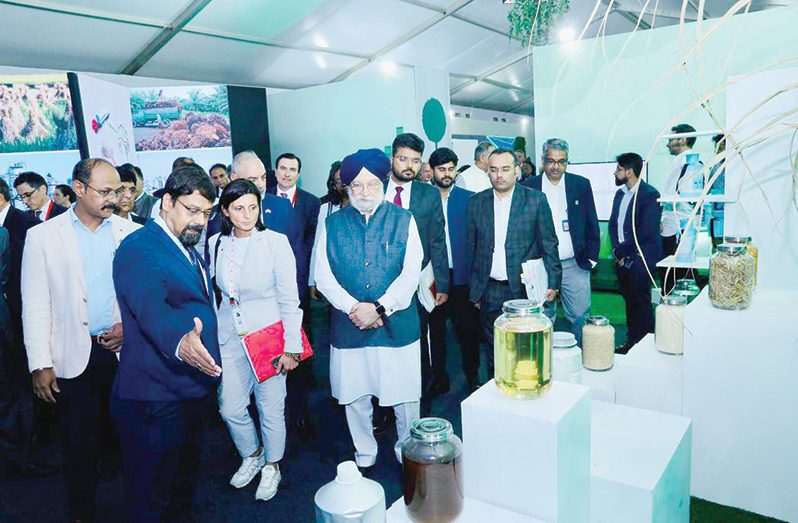WITH New Delhi’s goal of expanding deployment of biofuels as a low-carbon pathway, 19 countries, including Guyana, have joined India as initiating members of the “Global Biofuels Alliance” (GBA).
According to a press release from the High Commission of India in Guyana, the “fuels for future” was one of the elements that took top priority at the Energy Transitions Ministerial Meeting.
On the sideline of the Energy Transitions Ministerial Meeting, a stand-alone event on consultations and recommendations for the GBA was organised on July, 22 2023 in Goa.
The release read: “This event received strong support from countries within and beyond the G20. Nineteen countries expressed their interest in being the initiating members of the alliance with 15 countries and nine International Organizations attending the event,” adding: “This signifies a momentous step forward in advancing the development and deployment of biofuels through a multi-stakeholder global alliance.”
This GBA event witnessed participation from the energy ministers of 13 countries and heads of nine international organisations.
Among the many countries that welcomed the initiative were: India, Argentina, Bangladesh, Brazil, Canada, Guyana, Italy, Kenya, Mauritius, Paraguay, Seychelles, the United States, UAE and Uganda, and international organisations such as the Biofuture Platform, International Civil Aviation Organisation, International Energy Agency, International Energy Forum, International Renewable Energy Agency, World Bank, World Biogas Association, and World Economic Forum.
Moreover, Guyana was represented by its CdA a.i. based at the High Commission of Guyana in New Delhi.
After consultations of the alliance held on the sidelines of the G20 14th energy transition ministerial meeting in Goa on Saturday, an Indian Oil Ministry statement, which quoted India’s Petroleum Minister Hardeep Singh Puri, noted: “True success of Global Biofuels Alliance will depend on moving this project from a project of the government to the project of the people.”
Minister Puri stated: “The vision of PM Shri Narendra Modi is giving renewed thrust to collaborative efforts & knowledge sharing in the world’s green energy journey.”
An exhibition at G20 in Goa on July 22, traced the evolution of biofuels from ancient times to the present era. An “interactive Wall” detailed processes through which Biofuels are manufactured, along with a display of various feedstocks.
Furthermore, it was said that the exhibition also featured an Ethanol Cookstove, while technological models showcasing the production processes of 2G Ethanol, Sustainable Aviation Fuel, CBG & Biodiesel Green Energy gave a glimpse into a sustainable future powered by Biofuels.

Brazil, Italy, Kenya, and the UAE were among the nations that emphasised the significance of exchanging best practises in terms of implementation, technology, and policy.
The meeting commended the Indian presidency’s intention to advance towards the formation of the global alliance, because it was acknowledged that solving difficulties including feedstock management, standards development, and technical innovations needed a collaborative approach.
The attraction of biofuels as a low-carbon option was also emphasised by ministers from a number of other nations, who also emphasised how vital it is to support clean energy efforts. The leaders emphasised that despite the enormous potential of biofuels as a significant low-carbon development pathway, a number of obstacles still prevent their widespread use.
The press release also stated: “Jennifer Granholm, Secretary of Energy, US, remarked that the United States recognizes the establishment of a Global Biofuels Alliance as a critical step in their biofuels journey and that they look forward to moving from “test tube to test drive and field to fuels.”
The alliance’s significance was emphasised by Mr. Alexandre Silveira de Oliveira, Brazil’s Minister of State for Mines and Energy, who said that a variety of energy sources will be needed to meet the world’s needs for sustainable energy.
Additionally, international organisations such as the IEA and IEF emphasised the vast potential of biofuels for other nations and the significance of standardisation, waste recycling, and investments to maximise the potential.
The ICAO related that more than 600 billion liters of SAF are required to replace all fossil fuels, translating into more than US$3 trillion in investment by 2050.
Only two per cent of garbage is now recycled, according to the World Biogas Association, and this lack of recycling to edible products increases methane emissions. International Organisations have shown their eagerness to help the coalition as well.
“The forum recognized that overcoming challenges such as feedstock management, standards development, and technological innovations requires a collaborative approach and welcomed the initiative by Indian Presidency to create the global alliance,” the release further stated.
This consultative process resulted in the energy ministers recommending establishment of GBA to the G20 Leaders.



.jpg)








